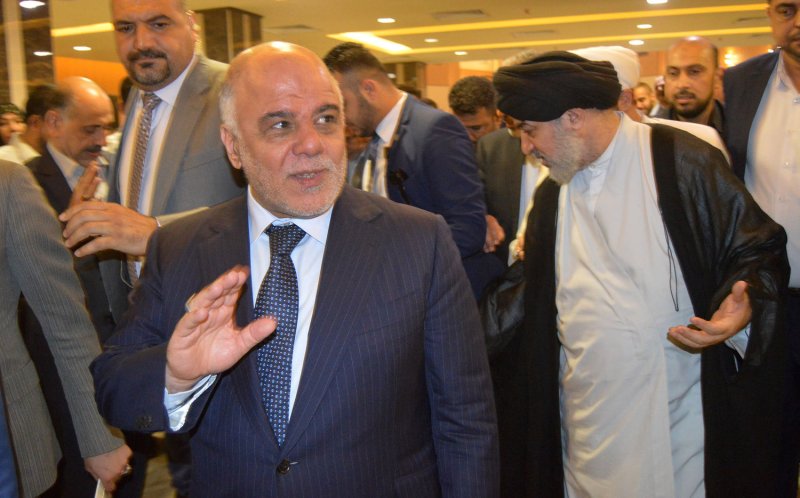The agreement to resume exporting Kirkuk crude through the KRG-operated pipeline came after the appointment of a new Iraqi oil minister and a visit by KRG Prime Minister Nechirvan Barzani to Baghdad to meet with Iraqi Prime Minister Haider al-Abadi, shown here in 2015. Photo by Mohammed Abbas/UPI |
License Photo
Iraq's federal government and the Kurdistan Regional Government have tentatively resolved their dispute over the export and sales of Kirkuk oil produced by the federal government in northern Iraq via the KRG-owned export pipeline system through Turkey. Baghdad, however, left the door open to other export routes for its Kirkuk oil, including trucking it from Kirkuk to Iran, if necessary.
The agreement to resume exporting Kirkuk crude through the KRG-operated pipeline following a five-month suspension came after the appointment of a new Iraqi oil minister and a visit by KRG Prime Minister Nechirvan Barzani to Baghdad to meet with Iraqi Prime Minister Haider al-Abadi.
This tentative deal reportedly involves splitting sale proceeds from 150,000 barrels per day of resumed Kirkuk oil flow 50-50 between Iraq's State Oil Marketing Organization and the KRG. Additional details are still to be hammered out between Iraq's Oil Ministry and the KRG's Natural Resources Ministry.
Newly appointed Iraqi Oil Minister Jabar Ali al-Luaibi authorized the resumption of Kirkuk crude exports through the KRG pipeline to the Turkish port of Ceyhan as a "good faith" gesture ahead of Barzani's meeting with Abadi.
The prickly relationship between Baghdad and Erbil — the two routinely tussle over budget allocation payments, ownership of Kirkuk oil, equitable distribution of oil proceeds and the KRG's drive for independence — means there are no guarantees that the Kirkuk dispute has been resolved.
In February, the KRG began including crude volumes from Kirkuk oil field production operated by the federal government's North Oil Co. into its own Kirkuk volumes in its official monthly export data, rather than separating out the NOC barrels as it had previously done.
This suggested that the KRG was no longer acknowledging Baghdad's sovereignty over NOC's Kirkuk-based oil operations. In March, the Iraqi Oil Ministry authorized NOC to cease pumping its Kirkuk crude into the KRG pipeline system.
Kirkuk oil has been an issue between Baghdad and Erbil since the KRG took control over much of the Kirkuk region in 2014, including two oil fields, the Bai Hassan and Avana fields that had been operated by the NOC. Baghdad viewed Erbil's seizure of the two Kirkuk fields as illegal; the KRG has insisted it moved to protect the Kirkuk region in the absence of Iraqi government troops as the Peshmerga effectively routed Islamic State forces. However, Erbil has made no secret that it has deemed Kirkuk part of KRG territory.
When the KRG began exporting crude through its pipeline system to Ceyhan in mid-2015, SOMO was cut out of any oversight of the sales. Baghdad has always insisted that SOMO be the sole marketer of Iraqi crude, of which it considers KRG oil to be part. The KRG began its own exports after accusing Baghdad of not honoring a revenue-sharing agreement and not allocating Erbil enough money from the federal budget.
Iraqi oil officials had warned that should an agreement with the KRG over the disputed Kirkuk barrels not be reached, Baghdad would consider a "swaps" arrangement with Tehran, in which 150,000 bpd of its Kirkuk crude would supply northern Iran with the Iraqi federal government taking the same volume of Iranian oil from Iranian ports on the Gulf.
The KRG coalition government's minority party, the Patriotic Union of Kurdistan — which is closely allied with Tehran, supports that option. It has long argued that the KRG's dominant party, the Kurdish Democratic Party, does not equitably share revenues with the PUK from oil sales.
A PUK delegation recently traveled to Baghdad to argue the case that the KDP should no longer have control over Kirkuk oil revenues. Not surprisingly, the PUK is actively promoting a deal with Iran in which two pipelines would carry crude from PUK-controlled oil fields in Kurdistan into Iran as part of a long-term "swaps" arrangement.
Both the federal government and KRG are reeling from financial crises brought about by the costly battle waged against IS and sustained low oil prices. Baghdad has been successful at ratcheting up its oil production to about 4.6 million bpd but the International Monetary Fund anticipates that the Iraqi federal government will record a $17 billion budget deficit this year.
The KRG, which produces about 500,000 bpd from its own territory, is unable to meet monthly budget expenses, of which it says some $800 million is needed to pay civil service salaries — with almost 40 percent of that dedicated to Peshmerga fighters. It would appear that this financial pressure is a strong impetus for Erbil to come to an agreement with Baghdad on sharing Kirkuk exports, regardless of how temporary it may prove to be.
This article originally appeared at The Arab Weekly.















